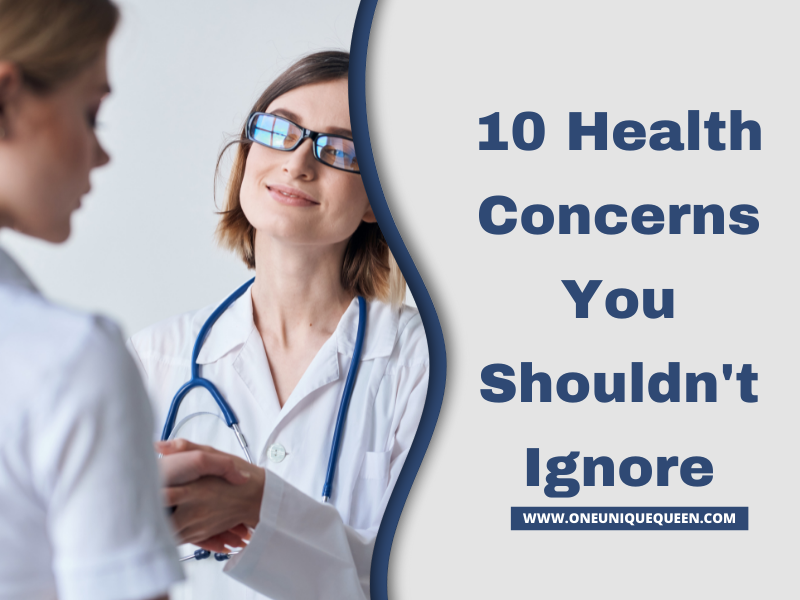


Let’s be honest—life can get pretty hectic. Between work, school, friends, and family, it’s easy to push your own health to the back burner. But as we all know, an ounce of prevention is worth a pound of cure. It’s essential to stay on top of your general well-being so you don’t end up in a hospital bed someday with serious regrets. It can be scary to acknowledge when something is wrong with your body. You might not want to believe something is amiss or think it will go away on its own. However, the sooner you address these red flags and work on fixing them, the better off you will be in the long run. Here are 10 signs suggesting something might be wrong with your health…

1. Chest pain or tightness in your chest
Chest pain can come with a variety of causes. It may be caused by a heart condition or an issue with blood flow to your heart. It may also be due to an issue with your lungs, such as stress, anxiety, extreme heartburn, acid reflux, or even an allergic reaction. Chest pain is not something that you should ignore. While it is often not serious, it is best to be safe and have it checked out. Chest pain is rarely a false alarm and can signify a severe medical condition. Chest pain is a symptom that should never be ignored. If the pain becomes unbearable or doesn’t go away, it’s best to see your doctor as soon as possible.
It is essential to know the signs of a heart attack for both men and women as both can present differently; they can include some or all of the following;
- Tightness, squeezing, or pressure in the chest
- Pain in other body parts is if radiating out from your chest
- Nausea/vomiting
- A feeling of dread or impending doom
- Shortness of breath
- Lightheadedness
- Anxiety
- Coughing/Wheezing
The symptoms can vary from person to person, but women are more likely to experience back or jaw pain along with nausea or shortness of breath.
2. Weight loss for no good reason
Weight loss is a common symptom of many illnesses, such as cancer, heart disease, and diabetes. It is also commonly associated with depression or eating disorders, like anorexia or bulimia. It could indicate something serious if you’ve been losing weight at a rapid pace and you’re not trying to lose weight. If you’ve been losing weight without a good reason, it’s essential to get it checked by your doctor. They can run some tests to see what’s causing the weight loss. Be sure to tell your doctor about other symptoms you’ve been experiencing. They can better diagnose you if you give them the full picture.
3. Persistent or recurring abdominal pain
A variety of conditions can cause abdominal pain. It could be a sign of an infection, such as food poisoning or a stomach ulcer. It could signify a gastrointestinal condition like Crohn’s disease, irritable bowel syndrome, allergies, or appendicitis. Appendicitis pain starts in the middle of your tummy, moves to the lower right-hand side, and becomes more severe and persistent. If you experience constant abdominal pain without a clear cause, it’s best to see your doctor as soon as possible. It’s important to rule out any serious or long-term conditions. If left untreated, these conditions could lead to serious health complications. If your abdominal pain is recurring, it may be time to see a doctor to figure out what is causing it and how to treat it.
4. Double vision
Double vision is often associated with aging and eye strain, but it may also signify a severe health condition. It can be a symptom of high blood pressure, a migraine, or even a stroke. If you notice that you’re seeing double, you should head to the emergency room as soon as possible. Vision loss is also a red flag that something is wrong with your health. If you notice sudden, unexplained vision loss, it could be due to diabetes or a brain tumor. You must visit an eye doctor if you experience vision loss, especially if it happens suddenly. If you notice that you are seeing double, it could be related to a serious health condition.
5. Pain or tenderness in one or both legs
If you experience ongoing pain or tenderness in one or both legs, it may be a sign that you have blood clots in your legs. This condition is called Deep Vein Thrombosis (DVT), and it’s a severe health risk. Left untreated, it can lead to a pulmonary embolism (PE), which can be fatal. If you notice ongoing pain or tenderness in one or both of your legs, it’s best to see your doctor. There are treatments available to prevent blood clots from forming and PE. Early detection and treatment are crucial. This is doubly important for frequent flyers or long-haul travelers who spend long periods sitting down. If you suspect you may be experiencing DVT, you can purchase accessories to help you minimize the risk of serious complications.
Signs of DVT can include;
- Swollen veins
- Warm patches around the sore area
- Throbbing one leg, very rarely will it affect both legs
- Swelling on leg
- Red or darkened skin.
If you experience any of these symptoms, you need to get medical treatment urgently, especially if it is accompanied by shortness of breath or chest pain.
6. New moles or changes to your skin
New moles or changes to your skin, like growth or a color change, may be a sign of skin cancer. Skin cancer is a widespread health scare and can be easily treated if caught early enough in some cases. If you notice a change in your skin, it’s best to get it checked out by a doctor. Early detection is crucial when it comes to skin cancer. It’s essential to look for changes to your skin and get any new moles examined. If a mole is concerning, you can have it checked out by a doctor to determine if it is cancerous.
7. Weakness in one side of your body
Weakness in one side of your body can signify many serious health conditions. It could be due to an issue with your spinal cord or a nerve issue. It could also be a sign of multiple sclerosis, stroke, or Lou Gehrig’s disease. If you experience sudden weakness on one side of your body, it’s best to see your doctor immediately. Early detection is crucial. There are treatments available that can help with the condition.
8. An excruciating headache
A sudden, excruciating headache is a red flag that something is wrong with your health. A severe headache could be a sign of a serious health condition, such as a brain tumor, stroke, or a blood clot. If you notice a sudden, excruciating headache, it’s best to get it checked out by your doctor. They can run some tests to determine what is causing the headache.
9. Changes to your bowel habits or burning when you pee
If your bowel habits change, it could indicate an underlying medical condition, such as Crohn’s disease or irritable bowel syndrome. If you notice that you are experiencing changes in your bowel habits, it’s best to see your doctor. This includes frequent diarrhea, increased bowel movement, changes to the color of your stools, and going for prolonged periods without any bowel movements. Your doctor can run some tests to determine what is causing the changes and how to treat them.
If you are experiencing a burning sensation when passing urine, you might suffer from a UTI (urinary tract infection). Usually, UTIs aren’t serious; however, you should see a doctor to determine if you have an upper or lower tract infection. Information about UTI’s can help you to determine if you have an infection and the type of treatment you may require to rectify the problem. In many cases, UTIs can be treated with a short course of antibiotics. However, some people may experience kidney complications, such as recurrent infections, resulting in unwanted side effects such as high temperature, back pain, or feeling generally unwell. In older people, UTIs can lead to confusion and behavioral changes too.
10. Numbness or tingling in limbs
Numbness or tingling in limbs can be caused by many conditions, such as diabetes or a pinched nerve. If you experience numbness or tingling in your limbs, it’s best to get it checked out by a doctor. They will be able to run some tests to determine what is causing it and how to treat it. It’s essential to address any health concerns as soon as possible. Ignoring your health can lead to severe, long-term conditions and even death. It’s necessary to take care of yourself and put your health first.
Conclusion
While life can get hectic, ignoring serious medical concerns negatively impacts your overall energy and physical and mental health. Taking the time to have your symptoms checked out by a doctor as soon as you notice any changes or new developments within your body can help you to get any treatment you need before your health deteriorates.
What other health concerns should you not ignore? Let me know in the comments below!










COMMENTS MAKE ME HAPPY!